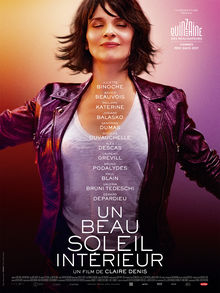
Juliette Binoche turns up so often in recent French films of note that it’s frankly embarrassing. I base all of my picks on critics’ recommendations so it’s not like I particularly like her. Here she’s in a film by a director whose work I’ve never seen before, Claire Denis. This is apparently loosely adapted from A Lover’s Discourse: Fragments by Roland Barthes which explains the eclectic nature of the main character’s relationships.
Isabelle is a middle-aged artist living in Paris who appears to have a habit of falling in and subsequently out of love with a variety of men. At first she is involved in a torrid affair with an arrogant banker and seems to harbor a hope for a longer term relationship. However when he tells her in no uncertain terms that he will never leave his wife, she breaks it off with him. Next she meets an actor for some sort of artistic collaboration. However she is surprised when he confesses to her about feeling stuck in a routine and disconnected from his wife. He seems intent on seducing her but she actually becomes impatient with talking and wants to move on to the sex. The next day, he tells her that he regrets the encounter and that it was a spur of the moment thing. So it goes when she momentarily rekindles her relationship with her ex-husband, is instantly drawn to a random stranger who walks into a dance hall and so on.
I found it difficult at first to get a handle on what this film was going for, especially as I have not read the book by Barthes. It’s only until the end when Isabelle goes for love advice from a fortune teller that I decided that it’s not meant to be flattering portrait of the character at all. Even though she is enthusiastic and authentic in each of her relationships, she can never be satisfied and is always on the look out for the next passion. What’s most interesting is that it’s clearly not the sex that she desires most of the time but the feeling of being in love and being loved itself. One of the few scenes in the film which has her interact with another female character involves her confessing about one of her greatest loves: that as she grows old her years of falling in love are behind her. She is reassured when the fortune teller tells her that there will definitely be a next one for her and even another one after that.
What makes this film especially interesting is that we do not often see this sort of behavior being portrayed so explicitly in a woman while it is a common trope in fiction to see it in men. Indeed she even admits that it is her own disgust at the bourgeois manners of the rich banker that makes her feel excited. Yet this is far from an admirable example of female empowerment. When a male colleague who clearly wants to seduce her himself comments that her latest paramour, an ordinary man who is not artistically inclined, is unsuitable for her, she easily allows herself to be persuaded and goes on to ruin the relationship. Even when she is enjoying a moment of passion with a partner, a single wrong word or move is all that is required to set her off in a fit of anger and turn her off. It’s fascinating to watch but I would stay far, far away from such a crazy woman.
Without knowing what Barthes wrote, I lack any deeper insights as to what director Claire Denis is trying to say here. As such I don’t really like this film, but I do think it is very original and interesting as a psychological portrait of a woman with some unusual desires.